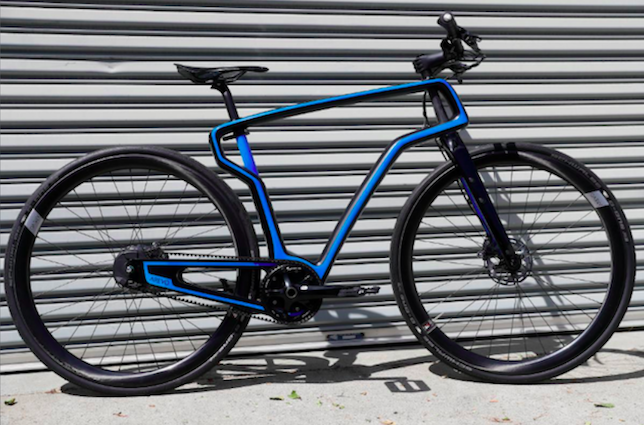In May, startup AREVO, launched its 3D printed all terrain city bike. However, the company didn’t stop there, and it has now unveiled the world’s first battery-assisted bike with a 3D carbon fiber frame.
It’s the second application of its unique carbon fiber 3D printing technology that allows for enhanced scalability. By using the company’s “one-of-a-kind 3D printing process”, they’re claiming to be able to save time creating the bikes. As well as this, the process provides designers and manufacturers with freedom.
AREVO’s process combines software, which can be used to test parts before they’re printed, with robotics, in the form of a robotic arm, and thermoplastic materials to create strong and durable final products which are customized for the rider.
Jim Miller, CEO of AREVO, said: “We have created a new paradigm for manufacturing that empowers businesses to create and source products locally by leveraging advancements in dynamic software and automation… The development of the eBike has proven that we can 3D print a new product when needed, at a low cost and localize the manufacturing process – significantly cutting down on the process and time it has taken historically to create bike frames.”

A New Paradigm for Manufacturing
For the electric 3D printed bike, AREVO partnered with OECHSLER, the German manufacturer focusing on automotive and medical parts. AREVO used the company’s DRIVEMATIC three-speed automatic gearbox for the 3D printed bike.
Thanks to this gearbox, riders have access to three speeds, integrated RFID and Bluetooth plus adaptive motor power for optimized boost. As well as this, by connecting a smartphone, riders can track the battery life and speed of the battery as well as the route and distance.
Michael Oppermann, Director Business Development, from OECHSLER, said: “We’re committed to being at the forefront of manufacturing innovation, and partnering with AREVO allowed us to explore a unique use case for our integrated drive system… With AREVO’s ability to quickly produce custom bike frames, we’ll be able to meet the increasing demand for eBikes at a fraction of the time, cost and environmental impact of the standard bike production process.”
Source: AREVO Press Release

License: The text of "AREVO Launches 3D Printed Carbon-Fiber eBike" by All3DP is licensed under a Creative Commons Attribution 4.0 International License.